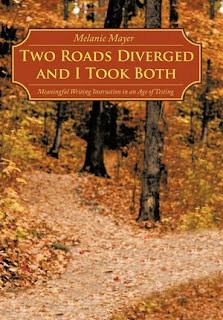Writing as an Essential Part of Education
By Melanie Mayer, English TeacherIt occurred to me after twenty years in the high school English classroom, that there was a disconnect between what we were asking our students to read, and what we were asking them to write. For example, we read primarily fiction: short stories, poetry, novels, drama. But we ask students to write personal narratives, documented arguments, compare/contrast essays. I believe for students to really become accomplished writers, and lose their fear and dread of writing, we need to provide them access, motivation, and empowerment through professional and mentor models.
I devoted a chapter to this in my book (July 2010), Two Roads Diverged and I Took Both: Meaningful Writing Instruction in an Age of Testing, and have since made it one of the subjects of my workshops and presentations I give regularly to teacher groups. I ask my students to write a personal narrative, a story of a chapter from their own lives. Then, before they turn it in, we read narratives, such as excerpts from Maya Angelou’s I Know Why the Caged Bird Sings (they love “Champion of the World”), and discuss what makes these narratives so good. Students will acknowledge the use of dialogue, of description that “shows instead of tells” the story, the pace, diction, point of view. We’ll read a couple of really good student-written narratives as well. Invariably, students will ask if they can have more time to rewrite theirs. Yes! Since I have started teaching narratives this way, the work my students have produced has been so much higher quality.
For teaching argument, we might read Ward Churchill’s “Crimes Against Humanity” and talk about his invective tone, his examples, allusions, proof (or lack of). Then we’ll read the humorous “Cruelty, Civility, and Other Weighty Matters,” by Ann Marie Paulin, to show that argument writing can take many forms and tones. I’ll show them Public Service Announcements, professional and student created, and we’ll talk about writing arguments for media. We’ll read student essays. Asking a group of students to write a documented argument paper, even with instruction, if they are not used to reading this type of writing, complete with in-text citations and works cited lists, isn’t fair. It causes anxiety, fear, and dread. It can be overwhelming. But empowering them first through access, and motivating them by discussions of causes that are close to their hearts, allows them to confidently – and eagerly - approach the assignment.
We read a lot of non-fiction now: causal analysis, comparison/contrast, memoirs, blogs, editorials. Kids should learn to read and write in school the things they will be reading and writing outside of school, for their life’s purposes. Education is to enhance quality of life. Connecting reading and writing instruction, and providing access and motivation, empowers students to write confidently, passionately, and thus, have a voice in their world.
Melanie Mayer has been teaching high school English in Port Aransas, Texas for 23 years, and has been an adjunct instructor at Del Mar College for 10 years. She is the winner of the Texas Exes Outstanding Teacher Award, Humanities Texas Outstanding Teaching Award, and is a state finalist for HEB Excellence in Education Lifetime Achievement Award. She has published several articles and a book on the subject of teaching English.


No comments:
Post a Comment